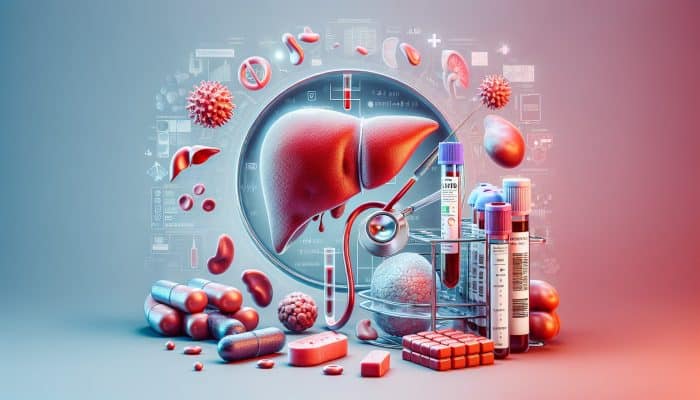Ultimate Resource for Understanding Liver Blood Tests to Enhance Your Health
Defining the Purpose of a Liver Blood Test

A liver blood test conducted in Ashford serves as an essential diagnostic method that evaluates the levels of numerous proteins, enzymes, and other vital substances in your bloodstream, thereby providing a comprehensive assessment of your liver's health status. This test is instrumental in identifying various liver diseases while also facilitating ongoing monitoring of the liver's functional capabilities. Through the analysis of these components, healthcare professionals can ascertain the liver's effectiveness in carrying out critical functions such as detoxification, protein synthesis, and the production of bile. Moreover, a liver blood test can uncover indicators of liver inflammation or damage, which may result from conditions including hepatitis, fatty liver disease, or cirrhosis.
Your liver plays a significant role in your body’s metabolic processes, underscoring the importance of regular health evaluations, particularly for individuals who exhibit risk factors such as alcohol consumption, obesity, or a familial predisposition to liver disorders. It is vital to comprehend your liver blood test results to make informed health decisions. Additionally, early detection and pre-emptive intervention can substantially improve health outcomes for those with liver-related issues.
Exploring the Various Types of Liver Blood Tests Available
Liver function tests consist of an array of specific assessments, each targeting different facets of liver health and functionality. Commonly performed tests include alanine aminotransferase (ALT), aspartate aminotransferase (AST), alkaline phosphatase (ALP), bilirubin, and albumin tests.
- ALT: Primarily found in the liver, elevated ALT levels can suggest potential liver cell damage.
- AST: While present in various tissues, increased AST levels may indicate inflammation or damage to the liver.
- ALP: Higher ALP levels could signify issues such as bile duct obstruction or underlying liver disease.
- Bilirubin: Elevated bilirubin levels can lead to jaundice and may suggest dysfunction within the liver.
- Albumin: This protein, synthesized in the liver, when found at low levels, may indicate chronic liver disease.
Each of these tests provides invaluable insights into liver functionality, and when considered together, they form a comprehensive picture of liver health. Understanding the significance of these tests can foster productive dialogues with your healthcare provider about your liver function and overall well-being.
Determining the Recommended Frequency for Liver Blood Tests
The frequency at which liver blood tests should be performed largely depends on individual health profiles and risk factors. For individuals with a pre-existing liver condition or those with a family history of liver disease, more frequent assessments may be necessary. Conversely, individuals who do not present with identifiable risk factors may only need testing during routine health check-ups. It is advisable to consult with your doctor to establish a tailored testing schedule that aligns with your health requirements.
Individuals classified as high-risk, including those with diabetes, obesity, or those who engage in excessive alcohol consumption, are strongly encouraged to undergo regular liver function assessments. Such tests can facilitate the early identification of liver damage and allow for prompt intervention. Furthermore, consistent testing enables the monitoring of the efficacy of lifestyle alterations or treatments aimed at improving liver health. Always engage with your healthcare provider to devise a testing routine that is appropriate for your unique health circumstances.
Critical Preparatory Steps for Your Liver Blood Test

Essential Steps to Take Before Your Liver Blood Test
Proper preparation for a liver blood test is crucial to ensure the accuracy of your results. In many cases, fasting may be required for a minimum of 8 hours prior to the test. Additionally, it is advisable to refrain from consuming alcohol for several days leading up to the test, as this can significantly skew the results. Certain medications may also need to be paused; therefore, it is essential to adhere to any specific instructions provided by your healthcare professional.
Being cognizant of these preparatory measures can help alleviate anxiety and ensure a smooth testing process. If you have any uncertainties regarding any aspect of the preparation, do not hesitate to reach out to your healthcare provider for clarification. This proactive approach will bolster your confidence and help you feel well-informed as you prepare for your liver blood test.
What to Expect During the Liver Blood Test Procedure
The process of conducting a liver blood test typically involves drawing a small sample of blood from a vein in your arm. This procedure is quick and usually results in minimal discomfort. A healthcare professional will first cleanse the area, apply a tourniquet to engorge the vein, and then insert a needle to collect blood into a vial. The entire procedure generally takes less than five minutes.
Once the blood sample is collected, it will be sent to a laboratory for thorough analysis. The laboratory team will assess the sample for various enzymes and proteins, yielding valuable insights into your liver health. Familiarising yourself with the testing process can reduce anxiety associated with blood tests, allowing you to focus on the significance of the results rather than the procedure itself.
What Happens Following Your Blood Test?

After your blood sample has been collected, it will be forwarded to a laboratory for comprehensive analysis, where it will undergo various tests designed to evaluate liver function thoroughly. Typically, the results from liver blood tests are made available within a few days; however, this timeframe may fluctuate depending on the specific laboratory. Once the analysis is complete, your healthcare provider will review the results with you, providing insights into your liver health and outlining any necessary subsequent steps.
In certain circumstances, abnormal results may warrant further testing or lifestyle modifications to address underlying issues. Your healthcare provider will guide you through these subsequent steps, ensuring that you fully comprehend the implications of the results for your overall health. It is essential to ask questions and seek clarification during this discussion, as it can significantly influence your health management and future decisions.
Understanding Your Liver Blood Test Results
Interpreting Normal Results from Your Liver Blood Test
Normal outcomes from a liver blood test indicate that your liver is functioning optimally, typically falling within established reference ranges. However, these ranges can exhibit slight variations among different laboratories, making it imperative to discuss your specific results with your healthcare provider. Normal levels of ALT, AST, and ALP generally suggest that there is no significant liver damage or disease present.
Understanding what constitutes a normal range can empower you to take charge of your health proactively. For instance, ALT levels are typically regarded as normal when they are below 40 units per litre; however, this threshold may vary based on age, sex, and other factors. Your healthcare provider can elucidate the nuances of your results and assist you in grasping their implications for your overall well-being.
Deciphering the Implications of Abnormal Test Results
Abnormal liver blood test results can indicate potential liver damage or disease. Elevated levels of specific enzymes or proteins may signify various conditions requiring further examination. For example, a significantly elevated ALT level could suggest acute liver injury, while an increased ALP level might indicate cholestasis or bile duct obstruction.
Recognising the potential implications of abnormal results is crucial for facilitating timely intervention. Depending on the context of your results, your doctor may recommend additional tests, imaging studies, or referrals to specialists for further evaluation. It is vital to approach these discussions with an open mind and a readiness to explore all potential avenues for treatment or lifestyle changes.
How to Effectively Communicate Your Results with Your Doctor
Preparing for a discussion about your liver blood test results can significantly enhance your understanding and decision-making process. Begin by jotting down any questions or concerns you have regarding the results. Additionally, make sure to mention any symptoms you may be experiencing or changes in your health that are causing you worry. This proactive approach will enable your doctor to provide tailored advice and appropriate follow-up recommendations.
Do not hesitate to ask about the implications of the results for your current health status, potential treatments, or recommended lifestyle adjustments. Understanding your liver health is a collaborative effort, and maintaining clear communication with your healthcare provider can greatly enhance your overall care experience. This open dialogue empowers you to make informed decisions regarding your lifestyle and health management moving forward.
Effective Lifestyle Modifications to Improve Liver Health
Implementing targeted lifestyle changes can significantly support liver function and elevate overall health. Adopting a nutritious diet, reducing alcohol intake, and engaging in regular physical activity are foundational steps that can yield substantial benefits for liver health. Discuss specific modifications with your doctor based on your test results, as personalised recommendations can provide the most effective guidance.
- Maintain a Balanced Diet: Focus on a diet rich in fruits, vegetables, and whole grains to nourish your liver.
- Limit Processed Foods: Minimise consumption of high-sugar and high-fat items to reduce the strain on your liver.
- Stay Hydrated: Drink ample water to support your body in flushing out toxins effectively.
- Exercise Regularly: Aim for at least 150 minutes of moderate-intensity exercise weekly to enhance liver function.
- Avoid Alcohol: Limit or abstain from alcohol consumption to mitigate potential liver damage.
By incorporating these lifestyle changes into your daily routine, you can significantly enhance your liver health. Regular monitoring through liver blood tests can help assess the impact of these modifications, providing you and your healthcare provider with invaluable insights into your progress.
Expert Insights on Liver Blood Tests in Ashford
Common Liver Conditions Detected Through Blood Tests
Routine liver blood tests can reveal several prevalent liver conditions that may otherwise go undetected. Identifying these conditions early on can lead to improved management strategies and health outcomes. The most frequently detected conditions include:
- Hepatitis: Inflammation of the liver, often resulting from viral infections that can affect liver function.
- Fatty Liver Disease: A concerning accumulation of fat within the liver, which can potentially lead to liver damage over time.
- Cirrhosis: Characterised by scarring of liver tissue, usually resulting from chronic liver injury.
- Liver Cancer: Abnormal cell growth within the liver that poses significant health risks, requiring immediate attention.
Identifying these conditions through liver blood tests facilitates timely intervention and the development of appropriate treatment strategies. Early detection can markedly improve the quality of life for those affected while diminishing the risk of severe complications.
Enhancing Health Outcomes with Liver Blood Tests
Regular liver blood tests are vital for enhancing health outcomes by continuously monitoring liver health, enabling early detection of issues, and informing treatment plans. For individuals with chronic liver conditions, these tests are essential in evaluating disease progression and the effectiveness of treatment options. They also assist in tailoring lifestyle changes based on test results.
To maximise the benefits of liver blood tests, individuals can undertake actionable steps that focus on lifestyle improvements. This may include dietary modifications, increased physical activity, and adherence to prescribed medications. Consistent follow-ups with healthcare providers can aid in monitoring progress and ensuring timely adjustments to treatment plans.
Expert Recommendations on Liver Blood Test Frequency
Healthcare experts recommend determining the frequency of liver blood tests based on individual risk factors and overall health status. For individuals diagnosed with existing liver disease or those exhibiting risk factors such as obesity, diabetes, or a history of alcohol consumption, more frequent testing may be advisable. Conversely, those without risk factors might only require annual testing during regular health evaluations.
Understanding your health history and associated risk factors can significantly influence the decision regarding testing frequency. Engaging in regular discussions with your healthcare provider regarding your liver health is crucial for making informed decisions regarding the timing and nature of tests required. This proactive approach ensures that any potential issues are identified early, allowing for timely intervention.
The Connection Between Lifestyle Choices and Liver Health
The Impact of Diet on Liver Function
The connection between diet and liver health is profound and critical. A balanced diet that is rich in fruits, vegetables, and whole grains supports optimal liver function while also helping to mitigate the risk of liver diseases. Limiting intake of processed foods, sugars, and unhealthy fats is essential in preventing conditions such as fatty liver disease and other liver-related health issues.
Incorporating specific foods can also promote liver health. For instance, foods abundant in omega-3 fatty acids, such as fish and nuts, can help reduce inflammation in the liver. Furthermore, antioxidants found in various fruits and vegetables combat oxidative stress, thereby safeguarding liver cells from damage. Establishing a diet that prioritises these beneficial elements can significantly enhance liver health over time.
- Include Leafy Greens: These help reduce fat accumulation in the liver and support overall liver function.
- Consume Fatty Fish: Rich in omega-3s, these are particularly beneficial for liver health.
- Incorporate Nuts: A great source of healthy fats and antioxidants that support liver function.
- Enjoy Berries: High in antioxidants, they can help protect the liver from oxidative damage.
Enhancing Liver Function Through Regular Exercise
Engaging in regular physical activity is pivotal for improving liver function. Exercise assists in reducing fat accumulation in the liver and alleviating inflammation. Additionally, it contributes to overall health by aiding in weight management, controlling blood sugar levels, and enhancing circulation—factors closely linked to liver health.
For individuals at risk of liver disease or those with existing liver conditions, adopting a routine exercise regimen can be particularly beneficial. Activities such as walking, cycling, and swimming are excellent choices that promote cardiovascular health while also supporting liver function. Setting realistic fitness goals can lead to sustainable changes that significantly enhance liver health over time.
The Effects of Alcohol Consumption on Liver Health
Excessive alcohol consumption presents a considerable risk to liver health, potentially leading to conditions such as fatty liver, alcoholic hepatitis, and cirrhosis. Alcohol intake can cause inflammation and damage liver cells, impairing the organ’s ability to function effectively. Moderation or complete abstinence is essential for maintaining liver health, particularly for individuals with pre-existing liver conditions.
Understanding the effects of alcohol on the liver can motivate individuals to make informed choices regarding their drinking habits. For those who do consume alcohol, it is crucial to be aware of recommended limits and consider regular liver blood tests to monitor liver health. Open discussions with healthcare providers regarding alcohol consumption can offer additional insights and support for healthier lifestyle choices.
The Correlation Between Liver Blood Tests and Other Health Conditions
Understanding the Relationship Between Liver Blood Tests and Diabetes
Liver blood tests can provide critical information regarding liver health in individuals diagnosed with diabetes. Diabetes can negatively impact liver function by increasing the risk of fatty liver disease and liver inflammation. Regular testing is essential for effectively managing both conditions, as it helps monitor liver function and assess potential complications.
For those with diabetes, maintaining a healthy lifestyle, including a balanced diet and regular exercise, is crucial for supporting liver health. Engaging in liver blood tests can also empower individuals to make informed decisions about their health management strategies, ultimately minimising the risk of liver-related complications.
Can Liver Blood Tests Indicate Heart Disease Risks?
While liver blood tests are not primarily intended as diagnostic tools for heart disease, they can provide valuable insights regarding liver function, which may be influenced by heart conditions. Elevated enzyme levels detected in liver blood tests can indicate stress on the liver caused by heart disease. Recognising this connection highlights the importance of comprehensive health evaluations that consider both liver and heart health.
For individuals at risk of both liver and heart disease, regular testing is advisable. Collaborating with healthcare providers to discuss the implications of liver blood test results can help create a holistic health management plan that addresses the needs of both organs.
Other Conditions That Liver Blood Tests Can Reveal
Liver blood tests can also identify a range of conditions beyond liver diseases. These tests may unveil issues related to thyroid dysfunction, certain infections, and autoimmune disorders, making them an invaluable tool for overall health assessments. Understanding the broader implications of liver blood tests can empower individuals to seek appropriate care for various health concerns.
Being aware of the interconnectedness of liver function with other bodily systems can motivate proactive health management. If abnormalities are identified, healthcare providers can suggest further testing or referrals to specialists to effectively address underlying issues.
Insights into Kidney Function Through Liver Blood Tests
Interestingly, liver blood tests can sometimes reveal abnormalities that may indicate kidney issues, given the interconnected nature of the liver and kidneys. The liver is responsible for filtering toxins from the blood, and any impairment in liver function can lead to increased strain on the kidneys. Thus, liver blood tests can serve as a supplementary tool in evaluating kidney health.
For individuals with existing kidney concerns or those at risk, understanding the potential relationships between liver and kidney functions is crucial. Regular monitoring through liver blood tests can provide valuable insights into the health of both organs, facilitating timely intervention when necessary.
How to Access Liver Blood Tests in Ashford
Finding a Facility for Your Liver Blood Test in Ashford
If you live in or around Ashford, you can obtain blood tests for liver function at various healthcare facilities, including hospitals, clinics, and private laboratories. Typically, consulting your GP is the first step in securing a liver blood test. Your GP can either provide a referral to an appropriate facility or arrange a direct appointment for you.
In Ashford, several private healthcare providers also offer liver blood testing services, often with shorter waiting times compared to NHS facilities. It is essential to explore your options and choose a facility that meets your needs in terms of convenience and reliability.
Understanding the Costs of Liver Blood Tests in Ashford
The cost of liver blood tests in Ashford can vary significantly, depending on whether you opt for NHS services or private healthcare. NHS tests are generally free at the point of use for eligible patients, while private tests can range from £50 to £150 or more, depending on the specific tests performed.
Discussing costs and coverage with your healthcare provider will assist you in making informed decisions regarding your testing options. Understanding your financial responsibilities upfront can alleviate any stress associated with the testing process.
Typical Waiting Times for Liver Blood Tests in Ashford
Waiting times for liver blood tests in Ashford can differ based on the facility and the urgency of the test. NHS services may experience longer waits due to high demand, particularly in densely populated areas. In contrast, private facilities often provide quicker access to testing, with results sometimes available within 24 hours.
It is advisable to inquire about estimated waiting times when scheduling your blood test, especially if you have specific health concerns that necessitate prompt attention. Knowing what to expect can help you plan appropriately and alleviate any related anxiety.
Commonly Asked Questions About Liver Blood Tests
What constitutes a liver blood test?
A liver blood test assesses various substances in the blood to evaluate liver health and diagnose potential liver diseases.
What is the recommended frequency for liver blood tests?
The frequency of testing depends on individual risk factors and health status. Consult your doctor for a customised schedule.
What do normal liver blood test results indicate?
Normal results typically signify healthy liver function, with specific enzyme levels falling within established reference ranges.
What should I do prior to a liver blood test?
You may need to fast for at least 8 hours before the test and avoid alcohol and certain medications as advised by your healthcare provider.
What occurs after a liver blood test is conducted?
Your blood sample will be analysed in a laboratory, and results are generally available within a few days. Your doctor will discuss the findings with you.
Can liver blood tests detect liver disease?
Yes, liver blood tests can identify various liver diseases by measuring enzyme levels and other critical substances.
What lifestyle changes can enhance liver health?
Maintain a balanced diet, stay adequately hydrated, engage in regular exercise, and limit alcohol consumption to support liver health.
Is there a connection between liver blood tests and diabetes?
Yes, liver blood tests can assist in monitoring liver function in individuals with diabetes, as diabetes can adversely affect liver health.
How can liver blood tests provide insights into kidney function?
Liver blood tests can occasionally reveal abnormalities that suggest kidney issues, considering the interconnected roles of the liver and kidneys.
Where can I have a liver blood test in Ashford?
Liver blood tests are available at various healthcare facilities in Ashford, including hospitals, clinics, and private laboratories. Consult your GP for referrals.



The exploration of liver blood tests as a critical component of health management truly resonates with me. It’s intriguing how these tests not only assess the liver’s health but also serve as a window into our overall metabolic functions. In my own experience, after facing some health challenges that led to a liver test, I learned firsthand the importance of understanding liver function markers like ALT, AST, and alkaline phosphatase. The results not only sparked a transformation in my dietary habits but also reinforced the vital connection between liver health and overall well-being.
It’s wild, isn’t it? Those liver tests can feel like an unexpected plot twist in the story of our health. One minute you’re sailing through life, and the next, there’s a lab report telling you that your liver might be auditioning for a role in a horror movie!
I appreciate how thoroughly you address the significance of liver blood tests in assessing overall health. It’s fascinating how much our liver does behind the scenes, and yet it often doesn’t get the recognition it deserves until something goes wrong.